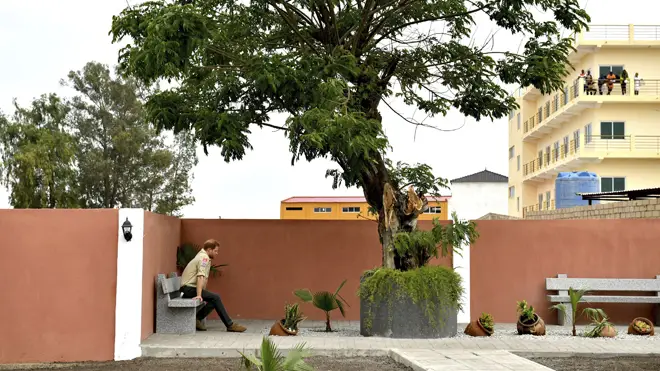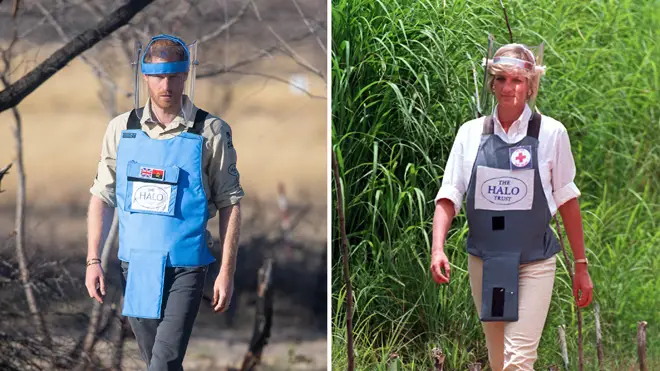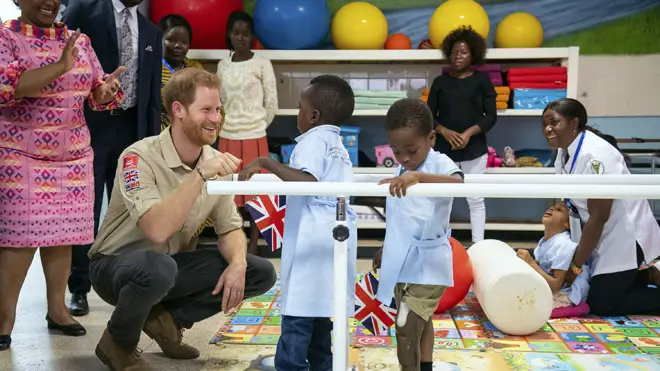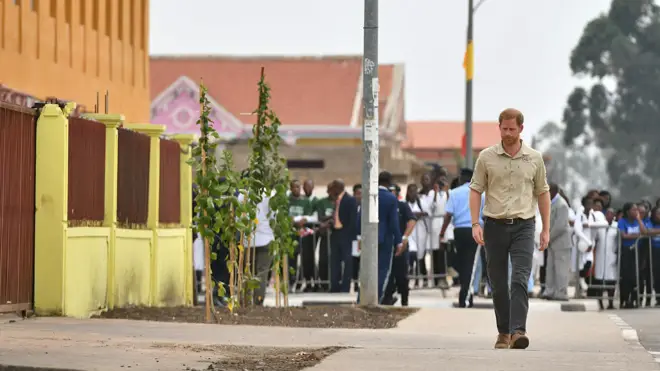
Shelagh Fogarty 1pm - 4pm
27 September 2019, 16:44
Prince Harry followed in his mother’s footsteps as he visited the spot where Princess Diana made her iconic walk through an Angolan minefield.
The Duke of Sussex also sat alone under The Diana Tree in Huambo on the fifth day of his tour of Africa.
The actions of his mother Diana helped bring about a global ban on the use of the weapons which devastated lives on the

continent.
Harry described the devices as the "unhealed scar of war”. He donned body armour and a protective visor and walked a patch that had been cleared of mines.

Harry watched as staff from the landmine clearance charity Halo Trust painstakingly worked to rid a remote area of Angola of military munitions.
Diana was pictured in a partially cleared minefield in the Angolan town of Huambo in 1997, to highlight the plight of those maimed by the weapons and to urge a worldwide ban.
Harry's mother never saw her work to help outlaw landmines come to fruition as she died the year of her Africa visit a few months before the treaty to outlaw the weapons was signed.
In a speech to mark his visit, Harry said: "Landmines are an unhealed scar of war. By clearing the landmines, we can help this community find peace, and with peace comes opportunity."

Speaking about Huambo Harry said: "Once heavily mined, the second city of Angola is now safe.
"With the right international support, this land around us here can also be like Huambo - a landmine-free, diverse, dynamic and thriving community connected to and benefiting from all that it has to offer."
An Angolan minister attending the event said the "humanistic heritage" of the princess's anti-landmine campaign was the catalyst for his country's final push to remove all the munitions by 2025.

Near the south-eastern town of Dirico the duke walked into an area in the Luengue-Luiana National Park that was once an artillery base for anti-government forces who had mined the position in 2000 before retreating.
The dusty scrubland was marked with red warning signs showing the skull and crossbones, with the Portuguese words "Perigo Minas!" and the English translation below - danger mines.
In 2005 a 13-year-old girl lost a foot after stepping on a mine in the area.
Jose Antonio, a regional manager for the landmine clearance charity the Halo Trust, took Harry onto the site where his staff have been working since August to make safe, and hope to complete their painstaking clearance by the end of October.
Harry watched as mine clearance worker Jorge Joao Cativa used a metal detector to search for the mostly anti-personnel mines buried in the ground.
If one is discovered staff are trained to move back and carefully remove the soil as they move forward until they reach the munition.
Angola's landmines are a legacy of a 27-year civil war which ended in 2002 leaving behind an unknown quantity of munitions that have injured and maimed tens of thousands of people.
Mr Antonio, said about Harry: "He was very interested in the work that my team are doing clearing the mines. He was very impressed; he knows it's hard and very slow and dangerous, and that you need to be very patient."
In June the duke gave his backing to a £47 million landmine clearing initiative to help destroy thousands of munitions in a huge conservation region of Angola.
The Angolan government is investing the funds in the Halo Trust, which will work over five years to rid 153 minefields of munitions in the south-eastern province of Cuando Cubango inside the Mavinga and Luengue-Luiana National Parks.
Working with other organisations the Halo Trust hopes the removal of the landmines will lead to the areas, with their wealth of habitat and wild animals, being rejuvenated and opening up to conservationists and eco-tourists.
The duke walked through an area of the site looking at the marked off areas which potentially could contain landmines.
An anti-personnel mine had been discovered earlier and Harry set it off with a controlled explosion which echoed around the area and sent up a large cloud of dust.
Lucio Goncalves Amaral, deputy minister for social integration, paid tribute to Harry's mother and said his countrymen and women were forever in her debt.
In a speech the politician told Harry: "Your visit to our country is of a great human and historical significance, as it follows the visit of the late Princess Diana of Wales to Angola in January 1997.
"We will never forget her priceless contribution to the campaign to ban the anti-personnel landmines. The Angolan people will be eternally grateful for her performance in the demining process of our territory.
"This humanistic heritage left by the late Princess of Wales is the motivation for the Angolan executive to proceed with the demining programme to free the country of mines by the year 2025."
The duke added: "Twenty-two years after my mother visited Angola, there are still more than 1,000 minefields in this beautiful country that remain to be cleared.
"I wonder if she was still alive whether that would still be the case, I'm pretty sure she would have seen it through."
After saying the UK pledges "our unwavering support" to the Angola's ambition to be landmine free by 2025 he added: "I call on all those countries that had their names stamped on these weapons, but who haven't helped in the clean-up, to please commit to ensuring we meet our collective goal."
Reporting by PA